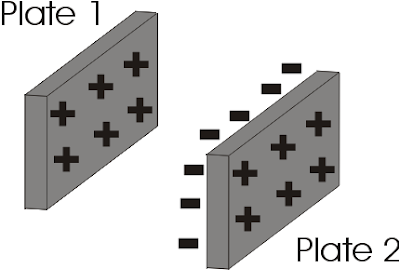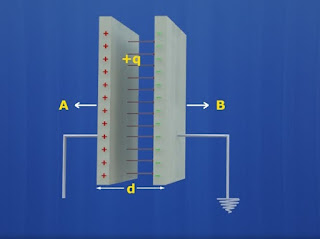The principle of Parallel Plate Capacitor
The capacitance of a charged conductor is increased by bringing another uncharged or low potential conductor near it. when some non-conducting medium is kept between them
Considers a positvely charged conducting plate A of small thickness in the air. Bring another uncharged conducting thin plate B Closer to plate Aa such that negative charge is induced on the nearer face of plate B and equal positive charge on the further face of plate B.
The induced negative charge on plate B trends to decrease the potential of plate A because -ve charge on the B tries to cancel the effect of +ve charge on A, while the induced positive charge on plate B trends to increase the potential of plate A. Since induced negative charge on B is closer to plateA than the induced positive charge, so there will be net decrease in the potential of A. In order to make the potential of the plate A same, more charge can be given to it. It clear the capacity of plate A has inncreased by bringing a conducting plate B closer to it.
If plate B in now connected to the earth induced positive charged will be neutalized by the electrons coming from the earth. Potential of plate A is further decreasd as now there is only induced negative charge on plate B. In the order to make the potential of the plate A same, more charge can be given to it. Thus, good deal of charge can be stored in the above arrangement.
A system so formed is called a parallel plate capacitor. Thus to store, a required between the conducting plates seprated by some non-conductting medium.
The capacitance of a charged conductor is increased by bringing another uncharged or low potential conductor near it. when some non-conducting medium is kept between them
 |
| The principle of Parallel Plate Capacitor |
Considers a positvely charged conducting plate A of small thickness in the air. Bring another uncharged conducting thin plate B Closer to plate Aa such that negative charge is induced on the nearer face of plate B and equal positive charge on the further face of plate B.
 |
| Parallel Plate Capacitor |
The induced negative charge on plate B trends to decrease the potential of plate A because -ve charge on the B tries to cancel the effect of +ve charge on A, while the induced positive charge on plate B trends to increase the potential of plate A. Since induced negative charge on B is closer to plateA than the induced positive charge, so there will be net decrease in the potential of A. In order to make the potential of the plate A same, more charge can be given to it. It clear the capacity of plate A has inncreased by bringing a conducting plate B closer to it.
 |
| Principle of Parallel Plate Capacitor |
A system so formed is called a parallel plate capacitor. Thus to store, a required between the conducting plates seprated by some non-conductting medium.











0 Comments